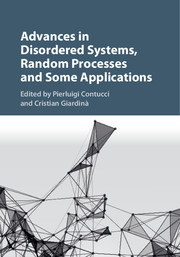Book contents
- Frontmatter
- Contents
- List of Contributors
- Preface
- 1 Topological Field Theory of Data: Mining Data Beyond Complex Networks
- 2 A Random Walk in Diffusion Phenomena and Statistical Mechanics
- 3 Legendre Structures in Statistical Mechanics for Ordered and Disordered Systems
- 4 Extrema of Log-correlated Random Variables: Principles and Examples
- 5 Scaling Limits, Brownian Loops, and Conformal Fields
- 6 The Brownian Web, the Brownian Net, and their Universality
- Index
4 - Extrema of Log-correlated Random Variables: Principles and Examples
Published online by Cambridge University Press: 19 January 2017
- Frontmatter
- Contents
- List of Contributors
- Preface
- 1 Topological Field Theory of Data: Mining Data Beyond Complex Networks
- 2 A Random Walk in Diffusion Phenomena and Statistical Mechanics
- 3 Legendre Structures in Statistical Mechanics for Ordered and Disordered Systems
- 4 Extrema of Log-correlated Random Variables: Principles and Examples
- 5 Scaling Limits, Brownian Loops, and Conformal Fields
- 6 The Brownian Web, the Brownian Net, and their Universality
- Index
Summary
Introduction
There has been tremendous progress recently in the understanding of the extreme value statistics of stochastic processes whose variables exhibit strong correlations. The purpose of this paper is to survey the recent progress in this field for processes with logarithmically decaying correlations. The material has been developed for the mini-course Extrema of log-correlated random variables: principles and examples at the Introductory School held in January 2015 at the Centre International de Rencontres Mathématiques in Marseille for the trimester Disordered systems, Random spatial processes and Applications of the Institut Henri Poincaré.
The study of extreme values of stochastic processes goes back to the early twentieth century. The theory was developed in the context of independent or weakly correlated random variables. The first book regrouping the early advances in the field is the still relevant Statistics of Extremes by E. J. Gumbel [43] published in 1958. Gumbel credits the first work on extreme values to Bortkiewicz in 1898, which is one of the first papers emphasizing the importance of Poisson statistics. After progress by Fisher and Tippett in understanding the limit law of the maximum of a collection of independent and identically distributed (IID) random variables, the theory culminated in 1943 with the classification theorem of Gnedenko [42] which showed that the distribution of the maximum of N IID random variables when properly recentered and rescaled can only be of three types: Fréchet, Weibull or Gumbel. Prior to this, von Mises had shown sufficient conditions for convergence to the three types. All in all, it took the theory sixty years between the first rigorous results and an essentially complete theory as it appears in Gumbel's review. There are now many excellent textbooks on extreme value statistics, see e.g., [19, 28, 49, 54].
The classical theory, however, does not apply to collections of random variables that exhibit strong correlations, i.e., correlations of the order of the variance.
- Type
- Chapter
- Information
- Publisher: Cambridge University PressPrint publication year: 2016
- 17
- Cited by



